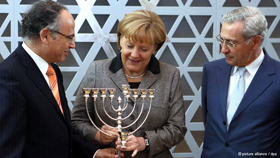Aleichem shalom, or Where Jews Feel at Home
(no votes) |
(0 votes) |
PhD in Law, PhD of Potsdam University
For most Jewish migrants the “point of separation” lay somewhere in the former Soviet Union, from which almost 2 million Jews emigrated. Today 12 percent of the world’s Jewish population are former Soviet citizens or their descendants who chose to settle primarily in Israel, Germany or the United States. What are the factors that allow a nation with less than 65 years of history to promote a unity of political and religious beliefs both inside and outside their country, and to keep on expanding their influence in the world, supporting close interaction with Jewish communities abroad and upholding their compatriots’ interests in other countries?
For most Jewish migrants the “point of separation” lay somewhere in the former Soviet Union, from which almost 2 million Jews emigrated. Today 12 percent of the world’s Jewish population are former Soviet citizens or their descendants who chose to settle primarily in Israel, Germany or the United States. What are the factors that allow a nation with less than 65 years of history to promote a unity of political and religious beliefs both inside and outside their country, and to keep on expanding their influence in the world, supporting close interaction with Jewish communities abroad and upholding their compatriots’ interests in other countries? Is there anything in the experiences of this nation that Russia may put to use to strengthen its geopolitical influence?
“One is allowed to follow the road he wishes to pursue”
The Talmud of Babylonia, Makkoth 10b.
What is remarkable about the Jews’ emigration from the former Soviet republics and their discovery of a new home, is the scale of integration, which, however, did not lead to their assimilation by host communities. The intrinsic unity of Jewish people is striking. They are capable of creating and accumulating entities that pursue Israeli policies far beyond the country’s own borders, that help preserve their cultural, linguistic and religious identity, and uphold the broader interests of Jewish people in other countries. They are capable of lobbying for the Jewish communities’ interests, leading to the passage of particular laws (in Germany) or the adoption of simplified long-term resettlement programmes (in the United States).
Over the past two decades, Israel has been the destination of choice for most Jewish migrants. Since 1980, this country has welcomed about 1 million people, in contrast to the 400,000 Jews immigrating to the United States, and about 200,000 heading to Germany [1].
Germany’s “Historical Duty”
German policy-makers see Jewish immigration as the “historical duty of the Germans to assist the resettlement [of Jews], so that an important and significant contribution be made in reinforcing and stabilizing Jewish life in Germany” (Guido Westerwelle), or as a “symbol of the high trust that Jews place in the country that tried to destroy [them]” (Claudia Roth).
Jewish migration to Germany has always enjoyed special status due to, for one thing, its nature (historically boasting numerous academics, doctors, engineers, musicians, economists, and lawyers) as well as its legal grounds.
Jewish migrants were welcomed into Germany through a special, simplified procedure. A similar mechanism was initially introduced in the 1980s for refugees from Vietnam and Albania. Jews from the former Soviet Union were recognized as humanitarian refugees and were granted residence permits subject to the law on continental refugees. Additionally, Jewish immigrants were the only group of migrants from the former Soviet Union that came to enjoy partial recognition of their labor or professional skills while not being considered citizens. Under the residency law and the Geneva Convention, Jewish people can not be extradited or deported from Germany [2].
According to the Federal Agency for migrants and refugees, almost half the Jewish people that have entered the country since the 1990s are members of the Jewish diaspora in Germany. Importantly, rules for joining the diaspora were significantly stricter that those applied to immigration to Germany in the 1990s. The diaspora required that the applicants were familiar with the religious dogmas, had a Jewish mother and were practicing Jews, while the immigration rules in place at that time did not require any documentary proof of observance or the practice of Judaism. To eliminate this “discrepancy”, in 2005 the government introduced stricter rules on Jewish immigration into Germany.
In terms of Jewish migration from the FSU, Israel has gained in numbers but lost to Germany or the United States.
Since then the Federal agency for migrants and refugees allows in any Jewish refugees, provided a local Jewish community agrees to accept a new member, and based on a written opinion from the Central Jewish Charitable Committee. They also heed the opinion of the Union of Progressive Jews, which may deliver their own view regarding the applicant. This contributed to creating a focused, selective migration policy, strengthened Jewish communities and entities within the country, while also reducing the number of Jews interested in settling in Germany. As a result, the country received 19,262 Jewish migrants in 2002; 15,442 in 2003, 5,968 in 2005; 1,079 in 2006, and 1,436 in 2008.
There is no direct answer to the question who allowed “focused migration” policies vis-à-vis Jews in Germany and how? We could review indirect evidence, bearing in mind what Franklin Roosevelt once said, “In politics, nothing happens by accident. If it happens, you can bet it was planned that way.” According to the 2003 book by David Korn, Das Netz. Israel’s Lobby in Deutschland, in the lower chamber of the Bundestag, 132 MPs lobby for the interests of Jewish people and Israel [3]. The author claims that there is not a single member of parliament that represents resettled Germans, and only five MPs have Turkish roots.
In 2007, Germany’s Social-Democratic Party (SDPG) set up a working group of Jewish social-democrats, as proposed by Sergei Lagodinsky, a Berlin-based lawyer, and Peter Feldman, mayor of Frankfurt. The group’s progenitors treat it as a “second [since 1945– O. Gulina] political emancipation of Jews in Germany” and as a signal to “the public and the party – we are here again, we are back on the political scene and we intend actively to impact the policy-making”.
Lautenberg Amendment, or Why America Needs Jews
The legislation relating to the migration of Jewish people as refugees and “a discriminated-against religious minority” was created via an amendment to the Foreign Operations Appropriations Act. It is better known as the Lautenberg Amendment, named for a United States Senator from New Jersey who proposed and expounded the amendment. Signed by President George Bush Sr. in November 1989, its term was extended repeatedly thanks to a robust Jewish lobby. The U.S. Congress again voted in favour of prolonging it on September 30, 2012.
Politicians in the United States receive significant donations: the U.S. Jewish community contributes about $ 60 million annually, while Arabs and other Muslim communities pledge about $ 297,000. Another factor in the Jewish community’s “political success” is its wise choice of allies. It could not be an accident that during George Bush Jr.’s presidency, the U.S. Assistant to the President for National Security Affairs Stephen Hadley; Deputy National Security Advisor Elliott Abrams; Senior Advisor and Deputy Chief of Staff Karl Rove, and the White House Chief of Staff to U.S. President Joshua Bolten were believed to be among the key lobbyists for Jewish communities. In 2008, 80 per cent of American Jews voted for Barak Obama. Their support remained at about 70 per cent in the 2012 elections.
The Lautenberg Amendment targets those citizens or residents of the former Soviet Union who belong to one of the “discriminated against religious minorities” (Jews, Evangelical Christians, etc.) and come from the post-Soviet countries. Through this amendment, the applicants are eligible for refugee status without the need to prove persecution. Refugee status applications can even be processed in the applicant’s home country, and the only mandatory requirement is to have close (direct) family over 21 years of age already resident in the United States.
Over the years that the Lautenberg Amendment has been in place, we have seen a third wave of Jewish immigration into the United States: about 400,000 Jews entered the country. Statistics for 2011 show that the country had 5,275,000 Jews, which works out at 2.1 per cent of the U.S. population. The largest Jewish communities are in New York (1,635,020, or 8.4 per cent population); California (1,219,740, or 3.3 per cent), Florida (638,635, or 3.4 per cent); New Jersey (504,450, or 5.7 per cent) and in the District of Columbia (28,000 people, or 4.7 per cent).
The Jewish immigration to the United States is not homogeneous; there are enclaves (groups) differing in their interests, age, country of origin, work or profession. However, the Jewish lobby in the United States is very well coordinated and covers all walks of life and interests: from the constitutional amendment on prayers to Iran’s nuclear programme, Israeli-Arab settlement, etc. There is no other ethnic group or community in the United States that can boast such a versatile and broad lobby.
Repatriate or Immigrate
You can not immigrate to Israel, you can only repatriate there: “back to your origins.” This may be the reason why Israel is the only country in the world where the population is not growing thanks to a higher birth rate but as a result of the massive return of Jews to their historical homeland, and where the granting of citizenship is intrinsically linked to the applicant’s ethnicity.
The Law of Return (“hok ha-shvut”) of five articles was approved by the Knesset on June 5, 1950. It guarantees every Jewish person the right to repatriate, or an opportunity to come to the country as a repatriate (Article 1 of the law). Under this law, a person is Jewish if his or her mother is Jewish, or if he or she converts to Judaism (giyur) and does not belong to any other religion.
In 1970, the Knesset approved an amendment giving the rights enjoyed by Jews under that law to their children, grandchildren, spouses and their children’s and grandchildren’s spouses, except for those Jews who voluntarily changed their religion (Article 4а of the law). In 1999, the Israeli Supreme Court ruled that Jewish descendants who practiced religions other than Judaism cannot be repatriated in Israel since they cannot be regarded as Jews under the provisions of the Law of Return. Additionally, a Jewish person can be barred from repatriation to their homeland if they have committed any acts against the Jewish people; if they are considered a threat to public health or the welfare of the State of Israel, or if they have a criminal past deemed a threat to law and order.
In contrast to the Russian model for interaction with compatriots, the institutional (intrinsic) unity of the Jewish people, supported by a broad network of Jewish organisations world over, provides a unique chance to lobby for Israel’s overseas interests, drawing on the ‘soft power’ of this diaspora.
In terms of Jewish migration from the FSU, Israel has gained in numbers but lost to Germany or the United States in terms of human resource potential Most repatriates to Israel were over 55: the average age of “returnees” was 40.5 years (against 35.5 among those who moved to Germany). The United States has more Jews with university degrees and professional education: 65.7 percent men and 62.7 percent women, compared to 45.9 percent men and 47 percent women who have chosen Israel, and 43.8 percent men and 38.4 percent women choosing Germany.
A critical situation was reached in 2002, when Israel, as a state for every Jewish person concerned about the country’s rising Arab population, received, according to statistics, 18,878 Jews while continental refugees to Germany numbered 19,262 people. According to Israel’s Foreign Ministry, some Jews from the former Soviet Union were going to the new CIS states to give up their Israeli passports, with a goal of applying for continental refugee status in Germany. The reason for this was found in a wide range of official support programmes – from free language courses to reimbursement for rent payments, unemployment benefits, non-deportation, etc. Jewish migrants who chose Germany received three to four times more financial support than those who settled in the U.S. or Israel [4].
Jewish Institutional Unity
Over the past 60 years, the people of Israel have gained their own state and also established Jewish institutional unity. This is fully reflected in the expansive network of associations and civil society institutions, which exist to disseminate the culture, traditions and religion and promote the interests of the Jewish people.
The World Jewish Congress, established in 1936 in Geneva, is a centre for numerous Jewish organisations and associations. The Congress positions itself as the voice of the Jewish people in the world community.
The European Council of Jewish Communities was set up in 1968, and is represented by 17 member organisations from 41 countries within Europe, and is engaged in disseminating Judaic culture, religion and welfare support for Jewish people.
The European Jewish Congress is a member of the World Jewish Congress, comprising 38 entities and representing the interests of 2.5 million Jews from over 30 European countries. Based in Paris, it has offices in Berlin, Strasbourg, Brussels and Budapest. Representatives of the European Jewish Congress regularly conduct consultations and meetings with government officials and interact closely with the European Union and Council of Europe.
A Jewish Contribution to an Inclusive Europe was set up in 1991, in Brussels, as a lobby group to support cooperation between the Jewish community and EU bodies, and to raise awareness and promote the involvement of the Jewish communities in pan-European initiatives. It is modelled on the American Israel Public Affairs Committee, an outstanding example of a political lobby.
The American Israel Public Affairs Committee was registered as a lobby in Washington back in the 1940s. By the late 1970s it emerged as the most influential Jewish community in the United States. Its influence and authority is shrouded in legend. In his book “The Jewish World” rabbi Joseph Telushkin illustrates it with an example of a confrontation between President Ronald Reagan and the Public Affairs Committee over the proposed sale of a military intelligence aircraft to Saudi Arabia. The president’s initiative was openly and actively opposed by AIPAC. The Senate found itself between the devil and the deep blue sea: between a strong, charismatic and popular president and the Committee’s powerful lobby. Reagan won, but with a slim majority of 52 votes to 48.
There is also the European Jewish Community Centre, the European Union of Jewish Students, the Conference of European Rabbis, among others.
Klal Yisrael (Unity of the People of Israel) Today
Many Jewish people believe that, by creating Israel as a state for all Jews, God honours his promise not to abandon the chosen people in foreign lands (Gospel of Matthew 23:37-39). Whether through Divine Providence or the active stance taken by Jewish organisations world over, the territorial fragmentation of the Jewish people seems to fuel its institutional (intrinsic) unity. And this, in turn, helps promote a feeling of shared destiny among all Jews, whether in Germany, the United States or elsewhere, and equally to lobby for the interests of their “homeland”, the State of Israel, across the world, helping all Jews find their “own home” wherever they may be in the world. This unity is supported financially through contributions by members of the community world over. The annual campaign by the charitable UJA-Federation collects about $ 700 million in the U.S. alone, of which one half goes toward funding educational, social or other development programmes within Israel, and the other half to Jewish lobby interests in the United States.
In addition, Jewish organisations are actively involved in raising awareness of their work; they are present on the Internet and have accounts in social networks. A few years ago The New York Times covered the donation of one million U.S. dollars by Google co-founder Sergey Brin to HIAS, the Hebrew Immigrant Aid Society, with a special focus on this society’s role in the Brins’ life after they emigrated from the Soviet Union to the U.S. under the Lautenberg programme. Promoting successful Jews as role models is a key element of Jewish organisations’ activity in the world as they act as coordinating centres and form a link to the homeland.
In contrast to the Russian model for interaction with compatriots, the institutional (intrinsic) unity of the Jewish people, supported by a broad network of Jewish organisations world over, provides a unique chance to lobby for Israel’s overseas interests, drawing on the ‘soft power’ of this diaspora.
Russia does not have any organized Russian-speaking diaspora today. The existing fragmented groups do not reflect the interests of most compatriots abroad, and have no interest in structuring long-term contacts or lobbying for the interests of their “historical” homeland. It is a sad fact that, because of this fragmentation and due to a lack of coordination, there is scant chance that there will ever be an efficient Russian lobby abroad similar to the Jewish diaspora. However, the diaspora’s “poor performance” today, should not deter the Russian state from trying to structure cooperation both horizontally and vertically.
Russia has an enormous human legacy among former Soviet citizens, Russian compatriots and their descendants, which can be exploited, to reinforce its geopolitical influence and to improve its image in the world. Closer relations and more fruitful cooperation with Russian-speaking diasporas abroad could benefit from:
- improving the existing, or developing a new programme for the resettlement of compatriots, taking their needs and opportunities, education and skills obtained abroad into account;
- establishing an ombudsman’s office to look after the compatriots and their descendants;
- providing funding to establish a network of coordination offices to forge links with compatriots across the world;
- establishing programmes to support various political groups, associations or parties, representing at least two thirds of migrants formerly from the Soviet Union, or their descendants;
- developing programmes to help compatriot descendants learn about political and legal institutions in Russia (e.g., offering internship opportunities at the federal and regional bodies of the legislative, executive or judiciary branches of power), and
- setting up cultural centres and centres for Russia’s ethnic languages in countries that are the preferred destinations.
Any nation or state seeking geopolitical success and influence today should realize that institutional cohesion based on a shared culture, language, traditions and/or religion stands a chance of becoming a dominant factor in the consolidation of any group, however scattered.
1. Ben-Rafael E. et al. Building a Diaspora. Russian Jews in Israel, Germany and the USA. Leiden/Netherlands, 2006. P. 3.
2. 19. Senat des VG München, Beschluss vom 07.08.2008, Az.: 19 B 07.1777, Rn. 29, 36,46, Vgl. VG Augsburg, Beschluss vom 11.07.2007, Az.: Au 1 S 07.622, Rn. 29; VG Osnabrück, Urteil vom 10.07.2006, Az.: 5 A 53/06; vgl. VG Karlsruhe, Urteil vom 19.12.2005, AZ.: 2 K 3314/04.
3. Korn D. Das Netz. Israels Lobby in Deutschland. München, 2003. S. 191.
4. Cohen Y., Haberfeld Y., Kogan I. Jüdische Immigration aus der ehemaligen Sowjetunion. Ein natürliches Experiment zur Migrationsentscheidung // Kalter F. (Hrsg.) Migration und Integration. Wiesbaden, 2008. S. 189–190; Harris P.A. Russische Juden und Aussiedler: Integrationspolitik und lokale Verantwortung // Bade K., Olmer J. (Hrsg.) Aussiedler: Deutsche Einwanderer aus Osteuropa. Osnabrück, 1999. S. 247–267.
(no votes) |
(0 votes) |








